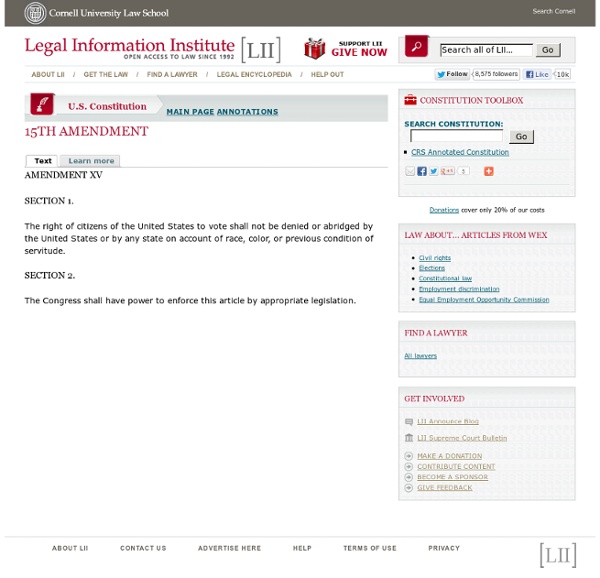



http://www.law.cornell.edu/constitution/amendmentxv
Liberal Republicans—They're Alive! Until not long ago, we tended to think of Republicans as unified and focused, and Democrats as inherently fractious (see, for instance, the evergreen "Dems In Disarray" headline). These days the opposite is true—or at least it's the case that Republicans have become just as divided as Democrats. But how much of that is about Washington infighting and intraparty struggles for power, and how much is actually substantive and matters to voters? This post from The Upshot at the New York Times has some provocative hints. Using polling data from February that tested opinions on a range of issues, they found that Republicans are much less unified than Democrats when it comes to their opinions on policy: On these seven issues, 47 percent of self-identified Democrats agree with the party’s stance on at least six of them.
Scalawags Aftermath & Reconstruction Scalawags "White Southern Republicans" Native white Southern politicians who joined the Republican party after the war and advocated the acceptance of and compliance with congressional Reconstruction were labeled scalawags. TENANT FARMING AND SHARECROPPING When the Civil War ended, the big question concerned the state of the freed slaves of the South. Recovery of the southern economy depended on getting the freedmen back into the cotton fields. During the period of Reconstruction the Radical Republicans in Congress tried to convert the freedmen into small free-holding farmers, but the former slaves were simply not ready to manage their own farms.
14th Amendment Amendment XIV Section 1. All persons born or naturalized in the United States, and subject to the jurisdiction thereof, are citizens of the United States and of the state wherein they reside. No state shall make or enforce any law which shall abridge the privileges or immunities of citizens of the United States; nor shall any state deprive any person of life, liberty, or property, without due process of law; nor deny to any person within its jurisdiction the equal protection of the laws.
Slavery By Another Name Bento After the Civil War, former slaves sought jobs, and planters sought laborers. The absence of cash or an independent credit system led to the creation of sharecropping. Sharecropping is a system where the landlord/planter allows a tenant to use the land in exchange for a share of the crop. This encouraged tenants to work to produce the biggest harvest that they could, and ensured they would remain tied to the land and unlikely to leave for other opportunities. In the South, after the Civil War, many black families rented land from white owners and raised cash crops such as cotton, tobacco, and rice. In many cases, the landlords or nearby merchants would lease equipment to the renters, and offer seed, fertilizer, food, and other items on credit until the harvest season.
WGBH American Experience . U.S. Grant: Warrior . Rise of the Ku Klux Klan Herb Peck A KKK Member At the time of Ulysses S. Grant's election to the presidency, white supremacists were conducting a reign of terror throughout the South. Carpetbaggers & Scalawags - American Civil War In general, the term “carpetbagger” refers to a traveler who arrives in a new region with only a satchel (or carpetbag) of possessions, and who attempts to profit from or gain control over his new surroundings, often against the will or consent of the original inhabitants. After 1865, a number of northerners moved to the South to purchase land, lease plantations or partner with down-and-out planters in the hopes of making money from cotton. At first they were welcomed, as southerners saw the need for northern capital and investment to get the devastated region back on its feet. They later became an object of much scorn, as many southerners saw them as low-class and opportunistic newcomers seeking to get rich on their misfortune.
Sharecropping and tenant farming Sharecropping was common throughout the South well into the twentieth century, and required the work of entire families. In this famous photograph, a six year-old girl picks cotton in Oklahoma. (Photograph by Lewis W. US House of Representatives: History, Art & Archives Image courtesy of Library of CongressA New York state politician for more than a decade, Representative Henry Raymond served only one term in the House of Representatives.